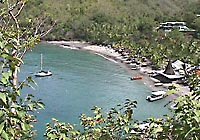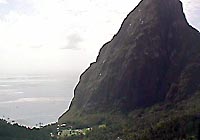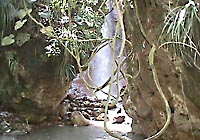 |
||||||||||||||||
Heavy rain last night made it feel like we were under a waterfall! The tin roof over our temporary home seemed to amplify the sound. We had 7-1/2 inches of rain in about 12 hours! The rain washed out roads, downed power and phone lines, caused landslides and flooded streets and homes. People in St. Lucia were totally taken by surprise because that was more rain than they usually get in the rainy season - and this is the dry season! The road into the village of Soufriere (SUE-frair) was washed out too, so travel was by boat only. Rain continued to fall this morning. The beach had been eroded by floods of water running into the bay. Sediments from flooded streams made the water murky and reduced underwater visibility. It seemed like a good day to stay on land and look at how volcanoes shaped this island - if we could get around the landslides! In addition to maneuvering around and through landslides, we had to be even more cautious because traffic here is reversed - with everyone driving on the left side of the road! The rain eventually stopped and the rest of our day was sunny, hot and humid. Volcanos are what you think about as you drive around the steep, rugged hillsides of St. Lucia, which was created from at least five volcanoes. Scientists tell us these volcanoes are either extinct or becoming extinct. The most noticeable features of St. Lucia are the Pitons. These look like strato-volcanoes. Actually these are volcanic lava plugs. (Check out "volcanoes" in our Research Library.) These gigantic plugs caused a HUGE volcano on St. Lucia to blow-up thousands of years ago, forming the caldera. The caldera filled with water and is now the bay between the Pitons. (This is where we looked for the whale shark two days ago.) We drove up to the ridge between the Pitons for a look into the gigantic caldera. (Rent the movie "Superman II" and you can see Superman standing on this ridge looking down into the caldera between the Pitons!) Imagine how HUGE this volcano must have been! We're sure glad we weren't here when this volcano blew-up! This old volcano is nearly extinct, but not quite. We drove about a mile down from the rim and found bubbling hot springs along the road. We could actually smell the hot springs before we saw them. They smell like rotten eggs! This bad smell is from the sulfur dissolved in the hot steaming water. In St. Lucia they call this "the world's only drive-in volcano!" Hot water, gas and mud bubble from vents heated by the hot rocks deep underground. We carefully walked along the hot springs. We stayed away from the hot bubbling water, not only because it smelled so bad, but because if you slipped into the water you could by scalded to death by the hot water (over 500ºF)! We followed the stream of water from the hot springs down the sides of the old volcano. As the stream ran down the hillside it mixed with cool streams coming down the hill. The stream continued its course down into the valley toward Soufriere, until it dropped off a cliff as a beautiful waterfall. (In "Superman II" you can also see Superman walking along the stream under this waterfall to pick a flower for Lois Lane!). As the sun set over the Petit Piton we thought about how fortunate we are that the volcanoes formed this beautiful island. Join us next when we visit Martinique and see how volcanoes can be dangerous and even deadly to people. |
Compare the beach in this picture (after the rain storm) to the same beach pictured on 2-21-2000. What is different about the beach? Notice how the water looks milky white.
The huge caldera between the Pitons. The Petit Piton is on the right. The Gros Piton is out of the picture to the left. The little dots at the edge of the bay are the tops of palm trees. The short dark lines in the water are boats.
This waterfall appears in the movie "Superman II." It's a good thing you can't smell this picture because the water smells like rotten eggs! |
|||||||||||||||
home | basecamp | archives | other expeditions | kids' page | contact us © 2001, The Ocean Adventure All rights reserved. |


